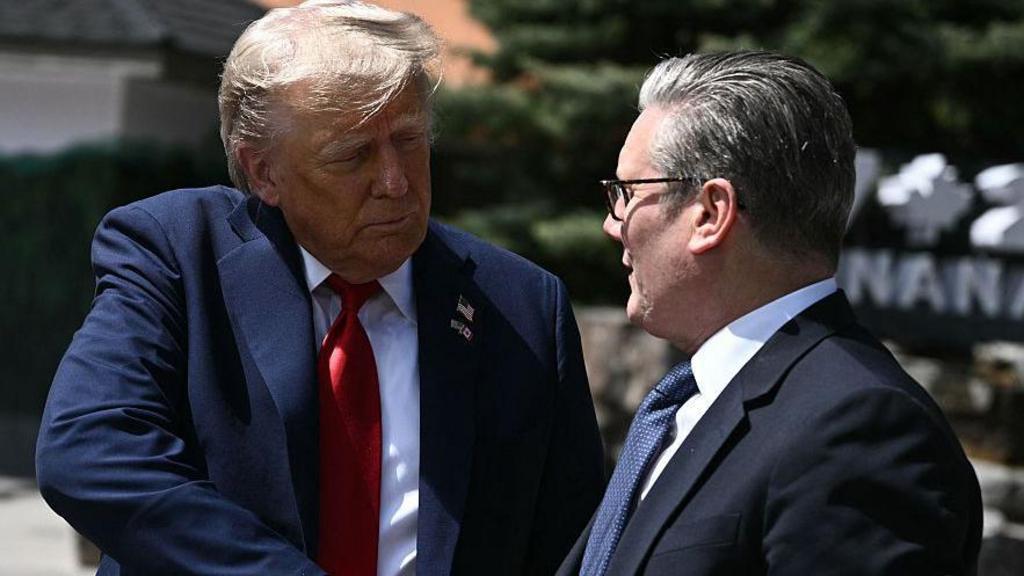President Trump signed an executive order reducing tariffs on UK vehicles imported to the US, implementing parts of a bilateral tariff agreement reached last month.
Prime Minister Starmer lauded the move as “a very important day” for both nations at the G7 summit in Canada.
This represents the first such agreement from the White House since the imposition of tariffs on various goods earlier this year.
However, a 10% levy remains on most goods, including cars, from the UK, and the removal of steel import tariffs is pending.
Monday’s announcement follows months of discussions aimed at reducing or eliminating tariffs on UK goods entering the US.
Concerns had been raised by UK industries, notably car manufacturers and steel producers, significant exporters to the US.
The signed deal permits up to 100,000 vehicles entry into the US at a 10% tariff, rather than the 25% imposed earlier this year.
The executive order outlines a similar system for steel and aluminum but lacks specifics.
Regarding potential steel tariff reductions for the UK, President Trump stated that details would follow.
The UK government affirmed its commitment to achieving 0% tariffs on core steel products, as agreed.
Responding to a question about future tariffs, President Trump asserted the UK’s strong protection, attributing it to personal preference.
Tariffs on certain aerospace products were also removed under the order.
Prime Minister Starmer highlighted the deal’s implementation regarding car tariffs and aerospace, describing it as a symbol of strong UK-US relations.
The US-UK tariff agreement takes effect seven days post-publication.
Mike Hawes, CEO of the Society of Motor Manufacturers and Traders, stated the agreement would allow many manufacturers to resume deliveries immediately.
He added that while awaiting full details, the agreement is reassuring to the sector and boosts US customer confidence.
Business and Trade Secretary Jonathan Reynolds stated that the announcement resulted from rapid government collaboration to ease burdens on UK businesses.
He further noted an upcoming parliamentary update on US beef and ethanol quota implementation, as per the deal.
US beef exports to the UK, previously subject to a 20% tariff within a 1,000-metric-ton quota, now face no tariff and a raised quota of 13,000 metric tons.
The UK government emphasizes that food standards remain unaffected, and all US beef imports must meet safety requirements.
Pressure mounted on the UK government to deliver on the agreement’s promises as President Trump continued to increase tariffs, including on steel.
UK steelmakers, while spared from the 50% tariffs, faced the 25% levy’s impact.
The UK government highlighted the US deal alongside trade agreements with the EU and India.
However, the US agreement is considerably more limited than the comprehensive trade deal previously discussed, appearing more restricted than the initial outline.
Despite President Trump’s characterization of the pact as a “major trade deal,” it is not. He lacks the authority to sign free-trade agreements without Congressional approval.
President Trump praised Prime Minister Starmer for achieving what others had not, securing the deal.
He contrasted Starmer’s success with previous six years of unsuccessful negotiations.
The pact has faced criticism from UK opposition parties, with Conservative leader Kemi Badenoch labeling it a “tiny tariff deal”.
The US president said he would end wars and now a vocal part of his support is urging him to stay out of this conflict.
The attack on two Minnesota state lawmakers in their homes was described as politically motivated.
It is the latest plan by US President Donald Trump’s family that looks to cash on his name.
As the military confrontation between Iran and Israel intensifies, what is Israel’s real endgame?
The president called on federal agencies to enforce the “largest mass deportation programme in history”.

